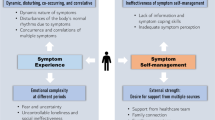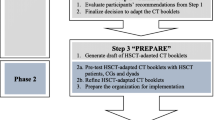Abstract
Background: Corticosteroids are documented as associated with psychological adverse effects, including insomnia, irritability, aggression, neuropsychological deficits, mood disorders (including severe depression), delirium, and psychosis. Given the severity of these potential adverse effects and that corticosteroid use is central to the treatment of most hematological malignancies, it would be expected that a thorough research literature would exist on the effects of corticosteroid use in hematology. However, scant research is available. This leaves many questions unanswered and a vacuum for clinical practice. Thus, there is a strong need for empirical data, not only on the psychological adverse effects experienced by patients, but also on the coping strategies patients use to manage them.
Objective: To present findings on the coping strategies used by ten hematology patients in Australia undergoing treatment involving corticosteroids as a first step in understanding the emotional and psychological effects experienced by this group of patients.
Methods: The pilot study was conducted from January 2007 until March 2008.
The study participants were ten hematology outpatients (eight with multiple myeloma, two with acute immune thrombocytopenia purpura) from two major Australian public hospitals (Princess Alexandra Hospital, Brisbane, Queensland, and Fremantle Hospital, Fremantle, Western Australia) who were taking dexamethasone and/or prednisolone and referred to the study by their treating hematologists on the basis that they were experiencing difficulties with their corticosteroid therapy.
Data were collected through an iterative, phenomenological, qualitative research methodology using open-ended interviews. Interview transcriptions were entered into the QSR NUD*IST (Non-numeric, Unstructured Data * Index and Searching Technology) computer program and analyzed thematically.
Results: Coping strategies found to be helpful by patients included believing that corticosteroids are necessary for disease control, knowing that the negative emotional states being experienced are due to the corticosteroids, stoicism and self-reliance based on a cognitive-rational approach, keeping busy, remaining fit and active, and, for some, using antidepressants to help with mood swings. For sleep disturbances, patients found it helpful to try to accept the sleeplessness, engage in distraction, and have light sleeps. Support from family and friends who understand the range of corticosteroid adverse effects, including patients’ need to withdraw during treatment, was seen as important. Counseling was not considered helpful. Tapering corticosteroid doses and cessation of corticosteroids were also discussed as aids to coping.
Conclusion: These findings provide a start to understanding how individuals cope with corticosteroid therapy for hematological conditions. There is a need for further extensive research in this area.

Similar content being viewed by others
References
Hong SI, Cho DH, Kang HC, et al. Acute onset of steroid psychosis with very low dose of prednisolone in Sheehan’s syndrome. Endocr J 2006; 53(2): 255–8
Naber D, Sand P, Heigl B. Psychopathological and neuropsychological effects of 8-days’ corticosteroid treatment: a prospective study. Psychoneuroendocrinology 1996; 21(1): 25–31
Patten SB, Neutel CI. Corticosteroid-induced adverse psychiatric effects: incidence, diagnosis and management. Drug Saf 2000 Feb; 22(2): 111–22
Beshay B, Pumariega AJ. Sertraline treatment of mood disorder associated with prednisone: a case report. J Child Adolesc Psychopharmacol 1998; 8(3): 187–93
Alisky JM. Dexamethasone could improve myocardial infarction outcomes and provide new therapeutic options for non-interventional patients. Med Hypotheses 2006; 67(1): 53–6
Koh YI, Choi IS, Shin IS, et al. Steroid-induced delirium in a patient with asthma: report of one case. Korean J Intern Med 2002; 17(2): 150–2
Braunig P, Bleistein J, Rao ML. Suicidality and corticosteroid-induced psychosis. Biol Psychiatry 1989 June; 26(2): 209–10
Wolkowitz O. Suicidality and corticosteroid psychosis. Biol Psychiatry 1990 Feb 15; 27(4): 459
McGrath P, Pun P, James S, et al. Psychological and psychiatric sequelae of steroid use in hematology treatments: a review of the literature. Australasian J Cancer 2007; 6(2): 87–95
de Fraine A, Diekman J, Gaynor G. Clinical guidelines for the use of antineoplastic agents: a publication of the Society of Hospital Pharmacists of Australia. 2nd ed. Crow’s Nest (NSW): The Society of Hospital Pharmacists of Australia, 1986
Gernsheimer T, Stratton J, Ballem PJ, et al. Mechanisms of response to treatment in autoimmune thrombocytopenic purpura. N Engl J Med 1989; 320(15): 974
Meyer O, Stahl D, Beckhove P, et al. Pulsed high-dose dexamethasone in chronic autoimmune haemolytic anaemia of warm type. Br J Haematol 1997; 98(4): 860–2
Hanks G, Trueman T, Twycross R. Corticosteroids in terminal cancer: a prospective analysis of current practice. Postgrad Med J 1983; 59(697): 702–6
Rowe JM, Buck G, Burnett AK, et al. Induction therapy for adults with acute lymphoblastic leukemia: results of more than 1500 patients from the international ALL trial — MRC UKALL XII/ECOG E2993. Blood 2005; 106(12): 3760
Facon T, Mary JY, Pegourie B, et al. Dexamethasone-based regimens versus melphalan-prednisone for elderly multiple myeloma patients ineligible for high-dose therapy. Blood 2006; 107(4): 1292
Saag KG, Koehnke R, Caldwell JR, et al. Low dose long-term corticosteroid therapy in rheumatoid arthritis: an analysis of serious adverse events. Am J Med 1994; 96(2): 115–23
Sirois F. Steroid psychosis: a review. Gen Hosp Psychiatry 2003; 25(1): 27–33
Krathwohl DR. Methods of educational and social science research: an integrated approach. New York: Longman, 1993
Spiegelberg H. Doing phenomenology: essays on and in phenomenology. The Hague: Springer, 1975
Polit DF, Hungler BP. Nursing research: principles and methods. 5th ed. Philadelphia (PA): JB Lippincott, 1995
Sorrell J, Redmond G. Interviews in qualitative nursing research: differing approaches for ethnographic and phenomenological studies. J Adv Nurs 1995; 21: 1117–22
Streubert J, Carpenter DR. Qualitative research in nursing: advancing the humanistic imperative. New York: JB Lippincott, 1995
Crombie IK, Davies HTO. Research in health care: design, conduct, and interpretation of health services research. New York: John Wiley & Sons, 1996
Greenhalgh T, Taylor R. How to read a paper: papers that go beyond numbers (qualitative research). BMJ 1997; 315: 740–3
American Psychiatric Association. Diagnostic and statistical manual of mental disorders: DSM-IV, 4th ed. Washington, DC: American Psychiatric Association, 1994
Van Manen M. Researching lived experience: human science for an action sensitive pedagogy. London (ON): State University of New York Press, 1990
QSR International [online]. Available from URL: http://www.qsrinternational.com/products_previous-products_n6.aspx [Accessed 2008 Dec 3]
McGrath P, Patton MA, James S. “I was never like that”: Australian findings on the psychological and psychiatric sequelae of corticosteroids in haematology treatments. Support Care Cancer. Epub 2008 May 14
The Cancer Council Australia and Australian Cancer Network. Australian Cancer Network Diagnosis and Management of Lymphoma Guidelines Working Party guidelines for the diagnosis and management of lymphoma: psychosocial effects of treatment of lymphoma. 2005: 350-1 [online]. Available from URL: http://www.cancer.org.au/Healthprofessionals/clinicalguidelines/Lymphoma.htm/ [Accessed 2008 Apr 29]
McGrath P. The burden of the ‘RA RA’ positive: survivors’ and hospice patients’ reflections on maintaining a positive attitude to serious illness. Support Care Cancer 2004; 12(1): 25–33
Brown ES, Frol A, Bobadilla L, et al. Effect of lamo-trigine on mood and cognition in patients receiving chronic exogenous corticosteroids. Psychosomatics 2003; 44(3): 204
Kostic VS, Levic Z. Psychiatric disorders associated with corticosteroid therapy. Neurologija 1989; 38(2): 161–6
Reinhart WH. Corticosteroid therapy. Schweiz Rundsch Med Prax 2005 Feb 16; 94(7): 239–43
Matsukawa Y, Sawada S, Hayama T, et al. Suicide in patients with systemic lupus erythematosus: a clinical analysis of seven suicidal patients. Lupus 1994; 3(1): 31
The authors would like to thank Mrs Elaine Phillips for her excellent work with transcribing, and Dr Peter Mollee and Dr Paul Pun for providing access to the study participants. No sources of funding were used to assist in the preparation or conduct of this study. The authors have no conflicts of interest that are directly relevant to the content of this study.
Author information
Authors and Affiliations
Corresponding author
Rights and permissions
About this article
Cite this article
McGrath, P., Patton, M.A. & Leahy, M. And Tell Yourself, “This is not Me, it’s the Drug”. Patient-Patient-Centered-Outcome-Res 2, 19–31 (2009). https://doi.org/10.2165/01312067-200902010-00003
Published:
Issue Date:
DOI: https://doi.org/10.2165/01312067-200902010-00003




